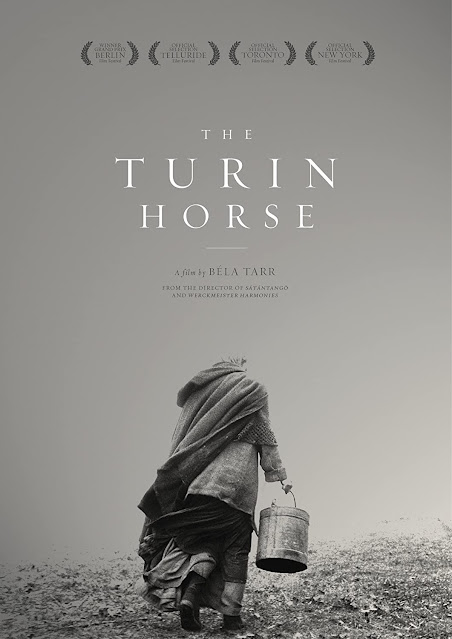Film Review: "The Turin Horse" Directed By Béla Tarr And Ágnes Hranitzky
 |
| Get ready to use your thinking cap while watching The Turin Horse. |
If I told you that one of the most important films of the 21st century is a black-and-white Hungarian film about potato farmers and their horse, I hope you would not look as me as if I lost my mind.
The Turin Horse seems like a straightforward story with no surprises, but the philosophical context of the main characters' bleak, poverty-stricken home ignites an awareness of our purpose and mere existence in life. Such a concept might seem esoteric to someone who is unconcerned about film theory. The Turin Horse will make you leave your comfort zone, yet, sometimes, movies need to do that to us. This film is not exactly disturbing or unnerving. It merely just tests both your patience and endurance during this exercise in contemplating everything around you.
Béla Tarr and Ágnes Hranitzky directed this film with an emphasis on the desolation that hinders a father and his daughter who live in the middle of nowhere. Their once dependable horse becomes unreliable and refuses to travel with them or eat. This weathered, helpless horse is the epicenter of these potato farmers' problems.
The lack of dialogue forces you to pay closer attention to the main characters' suffering. Cold, howling winds never cease.
They only eat potatoes.
On top of all this hardship, their well, once full of water, ends up depleted. Abruptly, the film ends in total darkness when the father and daughter choose to do nothing and accept their lack of resources. Unfortunately, detrimental scenarios akin to what these farmers face may not be a crowd-pleaser or cause you to gobble up your popcorn.
Then again, there needs to be stories like The Turin Horse to balance out the prevalent number of box-office-smashing, high concept movies being released like clockwork nowadays.
Most importantly, whenever a character speaks, the words initiate an opportunity for viewers to converse in philosophy, specifically the ideas and writings of Friedrich Nietzsche. I am sure Nietzche himself would applaud this marathon of a movie.
Although the The Turin Horse moves at a hauntingly slow pace, the daily hardships' monotony keeps us hypnotized and cognizant of what can shape or harm the human condition. Tarr and Hranitzky remind their audience that watching movies can and should be a philosophical experience, not just gratifying entertainment.
As the leaves turn brown and the temperatures slightly cool off, set aside an afternoon to ponder about what life might have in store for you during a viewing of The Turin Horse. This is what its directors intended.
The Turin Horse is available for streaming on Kanopy and borrowing on DVD from the Jefferson County Library Cooperative, including all 16 active Birmingham Public Library locations.
By William Anthony | Librarian Ⅰ, Citizen Services Department
Comments